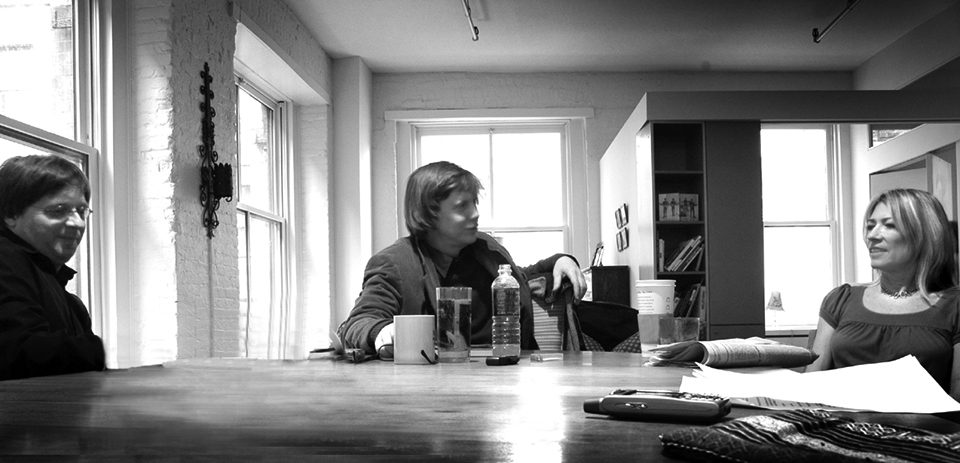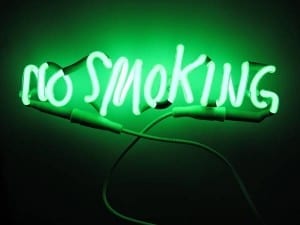Widely regarded as one of the most influential bands of their time, feeding their sonic experimentalism to notables like My Bloody Valentine, Pavement, Beck, and Yo La Tengo – Sonic Youth takes one more lunge at it with their new release, Rather Ripped. A few months ago, I sat with the band at Thurston Moore and Kim Gordon’s kitchen table in NYC, to chat about the album and life as veterans in rock.
The early SY years, framed by the 80s, are raw, difficult, and hard to understand. The band found themselves in direct contrast to the political conservatism and materialism that clutched America at the time. And while mania frothed up around acts such as Madonna and Duran Duran, SY was busy blowing the doors off warehouses and smoke-cloaked clubs, pounding No-Wave avant-rock into to the flesh of New York’s art house crowd.
This early phase, etched into eternity by train-screetching guitar noise and squalling dissonance, is best suited for the acclimated SY fan or adventure seeker. Sister (1987), the crowing achievement of this era, is both a dangerously freakish and powerful album. Daydream Nation (1988), which most regard as SY’s masterpiece, marks the second and much loved era. During this phase the band took their alternate tunings to an accessible level and became one of a special few bands to inaugurate Indie rock in the 90s.
The softer, more visceral, yet challenging and experimental, sounds evident in SY’s third era, alienated a lot of old school fans. Defined by what is referred to as ‘the New York Trilogy,’ consisting of NYC Ghosts & Flowers (2000), Murray Street (2002), and Sonic Nurse (2004), the third era is one that die-hards appreciate, but are still trying to reckon with.
Rather Ripped moves away from all three stages. It is a big, fat, pogo-stick-of-a bounce from its siblings in the Trilogy, which were largely influenced by Jim O’Rourke’s temporary stint in the band. Ripped speaks to the collision between a long, respected history and the artistic need to propel forward into new territory. SY pushes the abrasive back just enough keep it near, while still wobbling on the edge. And where Ripped lacks in danger it gains in song.
Pop/rock tunes like “Incinerate,” “Sleepin’ Around, ” and “What a Waste, ” harness the wild energy of SY’s heritage and delicately swaddle their gusty guitar noise tendencies. Through the album’s twists and turns, Ripped finds itself bright eyed and waist deep in more conventional song structures with bursts of raw texture.
The highlight of every SY album is Kim Gordon’s untutored, haunting, ashy, and whisperingly soft voice that brings every song she’s featured on to a crowning level of achievement. She, then and now, can be compared to hearing a field mouse roar.
Celeste Federico: The new album seems a little more upbeat.
Thurston Moore: Yeah. It’s kinda rocked up.
Celeste: Is there a strong theme or focus on this album that we haven’t seen before?
Moore: It’s different because Jim’s not playing with us. It’s less dark and twisty than the stuff we’ve done recently. We wanted to do something more instantaneous. And, it’s more stripped down and basic than usual. A lot of it has to do with the fact that Jim’s not here adding that other element. He’s very sophisticated musically. The record has a very New York vibe for me. Maybe more so than the last few records.
Gordon: More so than the New York Trilogy?
Moore: Yeah. The Trilogy was spirit-like, architectural, and humanitarian.
Lee Ranaldo: Did you read that somewhere?
Moore: No. It’s just how those three records landed. And now, this record is the rock and roll version of New York, beyond the Trilogy.
Celeste: You’ve kept that experimental sound that so clearly defines your music. How have you been able to maintain that despite the pressures of the recording industry?
Moore: We’ve always been an experimental rock group. So, it’s not like we ever needed to step away to do something experimental.
Celeste: You haven’t felt pressure to put out something that would appeal to the masses?
Ranaldo: Like rap-rock?
Moore: We’d sound like old people putting on young people’s clothes.
Steve Shelley: We couldn’t do that if we tried.
Gordon: They always say things like, “Can’t you reinvent yourself?”
Moore: You just ignore it and do what you do best. Like, during the days of techno they wanted us to do a techno remix. Imagine if we did that.
Gordon: It’s a myth that you have to be a mega hit to be able to keep going and doing what you love in rock.
Celeste: So what’s the secret? You’re still together after…
Ranaldo: It will be 25 years in September.
Moore: There’s no secret. You just do it.
Celeste: You hear a lot about internal drama within bands…
Gordon: It’s usually drugs, alcohol, and junkies.
Shelley: And number one singles.
Celeste: You all seem like pretty normal, grounded people, does that lend itself to…
Moore: To making fucked up music?
Shelley: It’s more interesting, in a way, to have the music be fucked up and have people who lead pretty regular lives behind it… rather than people who lead these fucked up lives but play pretty normal, traditional music.
Celeste: You guys are influential. Is there any one particular band that you’re most proud of influencing?
Moore: Oh, um, maybe The Stones.
Celeste: So, 25 years. What’s been your biggest moment?
Moore: Well, maybe when Iggy sang one of our songs in London and we were there.
Gordon: Well, Paul McCartney?
Moore: Yeah, hanging out with McCartney. He watched us from the side of the stage during an acoustic set, and came up afterwards wanting to know all about our tunings and stuff. We got his blessing and that was great. People like that, with that much history… it’s validating.
Celeste: You’ve had some strong themes in your songs, like feminism and equality, are there any messages on this album?
Moore: We address the right-wing Christian fundamentalist perspective on Rapture. It’s messed up that “the rapture” drives the decision making process for our Administration, and ultimately the rest of the world. Things do get addressed in the songs. I’ve been thinking about it lately. Almost every hit song you hear is just a boy-girl love song, which is fine, but I’m kind of curious why there aren’t more issue-driven songs.
Ranaldo: The boy-girl thing has always led the hit parade. Youth culture, at one point, did have issue-driven stuff like Positively Fourth Street.
Gordon: A lot of 60s music, like The Beatles, was geared toward albums and not hit singles, so it had more substance to it.
Celeste: You’d think we’d be hearing more about an anti-war message or something like that.
Gordon: It’s hard to write about war without sounding contrived. The beauty of Sonic Youth is that they have never been self-possessed or stricken by their own drama. They aren’t holding daggers to themselves trying to make peace with the mess they’ve become. Because there is no mess. They’re strikingly genuine people who honor the creative process and love making music. It’s refreshing to meet real people behind influential music in a world where just about everyone teeters on the insane.
Celeste Federico





